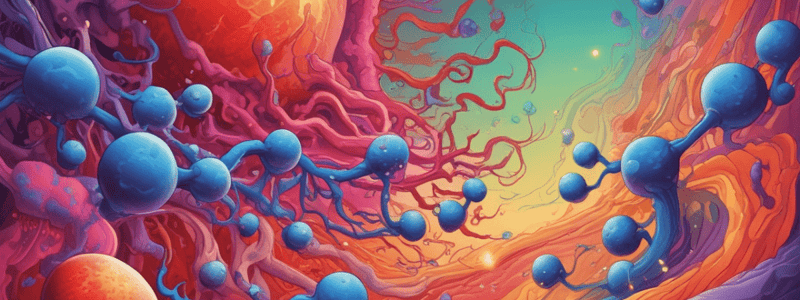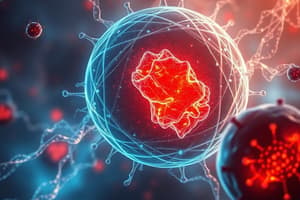Podcast
Questions and Answers
What is the characteristic feature of chronic inflammation in gall bladder wall?
What is the characteristic feature of chronic inflammation in gall bladder wall?
- Destruction of tissues by caseating granulomas
- Fibrosis of the gall bladder wall (correct)
- Acute gastritis due to Helicobacter pylori
- Ulceration due to imbalance of acid production and mucosal defense
Which of the following is NOT a cause of granulomatous inflammation?
Which of the following is NOT a cause of granulomatous inflammation?
- Helicobacter pylori (correct)
- Mycobacteria
- Foreign material from breakdown of artificial joint
- Syphilis
What is the characteristic feature of ulcerative colitis?
What is the characteristic feature of ulcerative colitis?
- Caseating granulomas
- Superficial inflammation (correct)
- Transmural inflammation
- Fibrosis of the intestinal wall
Which cell type plays a key role in macrophage-induced T cell activation in chronic inflammation?
Which cell type plays a key role in macrophage-induced T cell activation in chronic inflammation?
What is the main mechanism of tissue destruction in tuberculosis?
What is the main mechanism of tissue destruction in tuberculosis?
What is the primary characteristic of chronic inflammation?
What is the primary characteristic of chronic inflammation?
Which of the following is NOT a function of macrophages in chronic inflammation?
Which of the following is NOT a function of macrophages in chronic inflammation?
Which type of cells are primarily responsible for bacterial killing in chronic inflammation?
Which type of cells are primarily responsible for bacterial killing in chronic inflammation?
What is the primary mechanism by which macrophages accumulate in chronic inflammation?
What is the primary mechanism by which macrophages accumulate in chronic inflammation?
Which cytokine is responsible for activating macrophages in chronic inflammation?
Which cytokine is responsible for activating macrophages in chronic inflammation?
What is the primary effect of chronic inflammation on organ function?
What is the primary effect of chronic inflammation on organ function?
Which type of giant cell is commonly associated with tuberculosis?
Which type of giant cell is commonly associated with tuberculosis?
What is the primary role of fibroblasts/myofibroblasts in chronic inflammation?
What is the primary role of fibroblasts/myofibroblasts in chronic inflammation?
In which condition are plasma cells the predominant cell type in chronic inflammation?
In which condition are plasma cells the predominant cell type in chronic inflammation?
What is the result of macrophage-lymphocyte interactions in chronic inflammation?
What is the result of macrophage-lymphocyte interactions in chronic inflammation?
Flashcards are hidden until you start studying
Study Notes
Acute Inflammation
- Rapid response of living tissue to any injury, characterized by redness, swelling, heat, pain, and loss of function
Mechanisms of Disease
- Vascular dilatation, exudate leaks into tissues, and neutrophils emigrate
- Changes controlled by many short-lived chemical mediators that can be manipulated by drugs
- Neutrophils: fast-acting, short-lived phagocytes that engulf and degrade bacteria, dead tissue, etc.
Phagocytosis
- Enhanced by opsonisation of particles, e.g. antibody or complement on surface
- Bacterial killing largely oxygen-dependent
Defects in the System
- Lead to severe susceptibility to infection
Chronic Inflammation
- May take over from acute inflammation if damage is too severe to be resolved within a few days
- May arise de novo in some autoimmune conditions, chronic infections, or chronic low-level irritation
- May develop alongside acute inflammation in severe persistent or repeated irritation
Characteristics of Chronic Inflammation
- Microscopic appearances, with the type of cell present being the most important characteristic
- Macrophages are the primary cells present, derived from blood monocytes
- Macrophages accumulate due to recruitment from blood, mitotic division, and immobilization by cytokines
Macrophage Function
- Phagocytosis of debris and bacteria, including recognition, engulfment, and killing
- Activation once extravasated, with secretion of interferon gamma (IFN-γ) by sensitized T-cells, bacterial endotoxins, and others
Examples of Chronic Inflammation
- Repeated obstruction by gallstones, leading to fibrosis of the gallbladder wall
- Acute gastritis (alcohol, drugs), and chronic gastritis (Helicobacter pylori)
- Ulceration occurs due to an imbalance of acid production and mucosal defense
- Impaired function in inflammatory bowel disease, including ulcerative colitis and Crohn's disease
- Impaired function in rheumatoid arthritis, an autoimmune disease with localized and systemic immune response
Chronic Inflammation and Immune Response
- Overlap between chronic inflammation and immune responses
- Immune diseases cause pathology by chronic inflammation, and chronic inflammatory processes can stimulate immune responses
Granulomatous Inflammation
- Chronic inflammation with granulomas, characterized by persistent, low-grade antigenic stimulation and hypersensitivity
- Main causes include mildly irritant foreign material, Mycobacteria, syphilis, and unknown causes (e.g. sarcoid, Wegener's granulomatosis, Crohn's disease)
Tuberculosis
- Caused by Mycobacteria, especially M. tuberculosis, which is difficult and slow to culture
- Produces no toxins or lytic enzymes, but causes disease by persistence and induction of cell-mediated immunity
- Destruction of tissues by caseating granulomas, with patterns of disease including primary, secondary, and tertiary forms
Cell Types in Chronic Inflammation
- Lymphocytes, sometimes called 'chronic inflammatory cells', with complex, mainly immunological functions
- Plasma cells, differentiated antibody-producing B lymphocytes, indicating considerable chronicity
- Eosinophils, involved in allergic reactions, parasite infestations, and some tumors
- Fibroblasts/myofibroblasts, recruited by macrophages, making collagen
- 'Giant' cells, multinucleate cells made by fusion of macrophages, including Langhans type giant cells in tuberculosis and foreign body type giant cells
Effects of Chronic Inflammation
- Fibrosis, e.g. in gall bladder, chronic ulcers, and chronic inflammatory bowel disease
- Impaired function, e.g. in chronic inflammatory bowel disease
- Rarely increased function, e.g. mucus secretion, thyrotoxicosis in Graves disease
- Atrophy, e.g. gastric mucosa, adrenal glands
- Stimulation of immune response, including macrophage-lymphocyte interactions
Studying That Suits You
Use AI to generate personalized quizzes and flashcards to suit your learning preferences.




